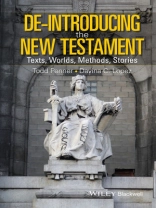In De-Introducing the New Testament, the authors argue
for a renewed commitment to the defamiliarizing power of New
Testament studies and a reclaiming of the discipline as one that
exemplifies the best practices of the humanities.
* A new approach that asks us to ‘defamiliarize’ what
we think we know about the New Testament, articulating themes and
questions about its study that encourage further reflection and
engagement
* Looks behind the traditional ways in which the NT is
‘introduced’ to critically engage the conceptual
framework of the field as a whole
* Provides a critical intervention into several methodological
impasses in contemporary NT scholarship
* Offers an appraisal of the relationship between economics and
culture in the production of NT scholarship
* Written in a style that is clear and concise, ideal for student
readership
สารบัญ
Acknowledgments ix
(De-)Introduction 1
Seeing Old Stones Anew 1
Introducing the New Testament as Introducing Traditional
New Testament Scholarship 4
Introducing Criticisms of Traditional New Testament Scholarship 9
Introducing De-Introducing the New Testament 17
1 The Order of New Testament Things: Questioning Methods and Meanings 25
The Bone-Box of James, ‘the Brother of Jesus’ 25
Ways of Knowing a Subject of Study 31
Ordering Principles in the Study of the New Testament 35
Ways of Knowing New Testament ‘Things’ 62
2 Foregrounding New Testament Backgrounds: Contextualizing Interpretation 71
Jew’ or ‘Judean’? The Present Confronts the Past 71
Introducing the New Testament: Making Meaning with the Context 76
Backgrounding the Backgrounds Approach 83
Backgrounding the Character of Early Christianity: Liberty against Tyranny 97
Contexts Matter, Ancient and Modern 110
3 Objects, Objectives, and Objectivities: Material and Visual Culture and New Testament Studies 119
Of Fragments and Forgeries 119
Archaeology and the Making of Objects 122
Excavating Discourses that Produce Ancient Objects 133
What Do We Do with Ancient Objects? 145
What Do We Want with Ancient Objects? 160
4 Brand(ish)ing Biblical Scholars(hip): New Testament Studies and Neoliberal Subjectivity 169
Who Can Be a ‘New Testament Scholar?’ 169
Neoliberalism and the Politics of Identity 173
Branding as a Practice of Neoliberal Subjectivity 183
Branding New Testament Scholars(hip) 191
The One-Dimensional New Testament Scholar? 205
Back to the Future: Concluding Observations on History, Method, and Theory in New Testament Studies 215
Index 000
เกี่ยวกับผู้แต่ง
Davina C. Lopez is the author of Apostle to the Conquered: Reimagining Paul’s Mission (2008).
Todd Penner is the author of Contextualizing Gender in Early Christian Discourse (with Caroline Vander Stichele, 2009) and In Praise of Christian Origins: Stephen and the Hellenists in Lukan Apologetic Historiography (2004).
Both Lopez and Penner conducted research for this book as scholars-in-residence at the Burke Library of Union Theological Seminary/Columbia University between 2010 and 2011. In addition, they are both Senior Editors for the Oxford Encyclopedia of the Bible and Gender Studies (2014) and have co-authored numerous essays together related to method and its consequence for interpretation in the study of the New Testament.












